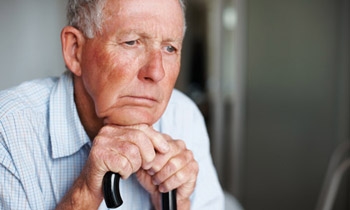One in four Americans aged 65+ falls each year. Every 11 seconds, an older adult is treated in the emergency room for a fall; every 19 minutes, an older adult dies from a fall. Falls are the leading cause of fatal injury and the most common cause of nonfatal trauma-related hospital admissions among older adults.
Tripping and falling can happen to anyone, at any age. But they present a particular danger to older people, who often don't recover as easily. For an older person, a fall can make the difference between a healthy, active lifestyle and a housebound one-and can lead to life-threatening complications. However, falls don't simply happen as a natural part of aging. Many older adults never have a falling episode.
Are You at Danger for a Fall? Elderly Fall Risk Factors
Here are a few signs that you or a loved one may be at risk for a serious fall:
You get dizzy when you go from sitting or lying down to standing. This is called postural hypotension. Most people experience it at some point in our lives, but older adults are more susceptible. It can be caused by dehydration-another condition that can strike anyone, but that is particularly common in the elderly-as well as certain medications and conditions.
You have foot pain or wear unsafe shoes. If you have a condition that leaves your feet in pain-or if you experience a lot of foot pain or numbness from standing for a long time-this might leave you at risk of falls. Other risks include unsteady shoes such as high heels, backless shoes, and those with smooth soles rather than treads. All of these can present a danger of slipping.
You have vision problems. This can also happen to anyone, but is more likely in older adults. Cataracts, glaucoma, and problems with depth perception can all lead to falls. Multi-focal glasses can also cause perception problems while you're moving around. In addition, if you have vision problems, your eyes may adjust more slowly between light and dark rooms-making it tougher to navigate.
You have dementia. Confusion can result in falls, especially for someone who wakes up disoriented and unsure of the layout of a room, especially at night. This is common in dementia patients, leaving those with Alzheimer's and other neurological disorders with increased risk of tripping and falling.
You take a lot of prescription drugs. Those who take a lot of medications are at greater risk of falling, as many prescription medications can cause dizziness or physical unsteadiness. It's definitely worth talking to your doctor if you have a lot of medications and experience dizziness on a regular basis.
You aren't active. Falls are much more likely to happen in people who have weaker leg muscles, slower reflexes, and poor motor control skills. Some of these problems are a natural part of aging, but leg muscles don't have to atrophy, and strength can be kept up just by gentle walking on a treadmill every day-although you should definitely talk to your doctor before starting a new exercise regime if there's any cause for concern.
Your home isn't fall-proof.
Most falls happen at home. If you have to go up and down stairs at home, have uneven flooring or raised thresholds, don't have night lights in your hallways, and have other hazards in the home, it may be time to evaluate and make your living space safer.Falls can be devastating, and as you get older, they can cause more damage. Assess whether you're at risk of falls, and talk to your doctor if any medication or chronic condition is involved. Take a look at your home and try to identify opportunities to make it safer. Stay away from unsteady shoes, and stay hydrated. If you do, hopefully you can reduce the likelihood of a fall.
Related Articles:
Home |
About
|
Articles
|
Resources |
Site Map |
Privacy Policy
Elder Options of Texas
Copyright 2001-2024
All Rights Reserved
DISCLAIMER: Links to other websites or references to products, services or publications do not imply the endorsement or approval of such websites, products, services or publications by Elder Options of Texas. The determination of the need for senior care services and the choice of a facility is an extremely important decision. Please make your own independent investigation.


